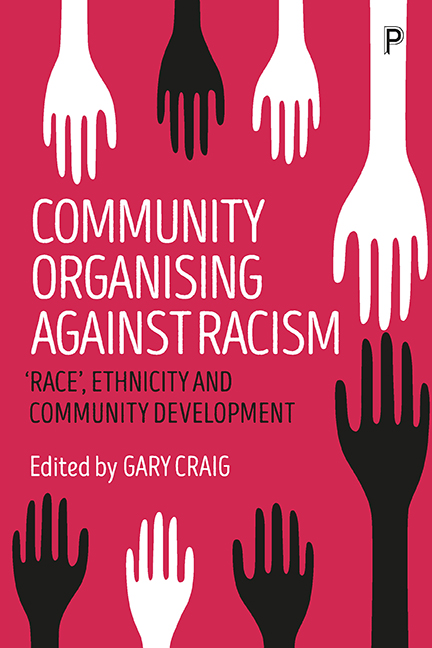Book contents
- Frontmatter
- Dedication
- Contents
- List of figures
- Author biographies
- List of abbreviations
- Introduction
- Section One Community development with ethnic minorities: history, theory, policy
- Section Two Building capacity with BME groups
- Section Three Working with Roma communities
- Section Four Global experience
- Section Five Working across cultural boundaries: ideological and personal reflections
- Afterword: Messages for community development in working with minority groups
- Index
Eleven - Romani activism and community development: are mediators the way forward?
Published online by Cambridge University Press: 12 April 2022
- Frontmatter
- Dedication
- Contents
- List of figures
- Author biographies
- List of abbreviations
- Introduction
- Section One Community development with ethnic minorities: history, theory, policy
- Section Two Building capacity with BME groups
- Section Three Working with Roma communities
- Section Four Global experience
- Section Five Working across cultural boundaries: ideological and personal reflections
- Afterword: Messages for community development in working with minority groups
- Index
Summary
Introduction
Our ambition goes beyond mediation. As long as Roma face human conditions far worse than the rest of the Europeans, we cannot be fully satisfied with the results of our work. We cannot be satisfied as long as Roma people live in ghettos, as long as children attend segregated schools and as long as there are groups who de facto cannot vote. We cannot be satisfied as long as the injustice towards Roma people persists. The programme is only one important element of a complex change. The result needs to be reinforced further with other elements of democratic participation. This means creating opportunities for the involvement of the Roma in decision-making processes. This means enabling Roma to assume responsibility for their own future. (Thornjorn Jagland, Secretary General of the Council of Europe (emphasis added)
This chapter examines a particular example of ‘democratic participation’ within the diverse and heterogeneous Roma communities across Europe – the role of community and cultural mediators. To what extent have various mediation training programmes helped or hindered Romani empowerment and emancipation across the member states of the EU? To address this question requires some critical thinking about an array of strategic and policy-orientated work; the on-going policy/educational activities around mentors can help to shed light on structural initiatives arising out of this significant developmental work (for example, within health promotion as well as in improving access to educational opportunities). In the last ten years there has been significant growth in European funding to promote Roma mediation via the training and employment of Romani mediators in more than 20 member states. Much funding has come from the Council of Europe and its ROMED programmes, which started operation in July 2011. The main areas of attention for such efforts have been employment (Messing, 2014, pp 6–10), health (Open Society Foundations, 2011, pp 37–44) and education (Friedman, 2013, pp 11–12). Mediators, largely coming from a Roma background themselves, now numbering well over 1,000 people across the EU, are employed by public authorities to act as a ‘bridge’ between the wider Roma communities and state agencies and institutions, with a view to promoting ‘culturally appropriate’ engagement with public services. ROMED1 has moved into a second phase, ROMED2, and this is working in tandem with another initiative, the Council of Europe and European Commission joint project ROMACT.
- Type
- Chapter
- Information
- Community Organising against Racism'Race', Ethnicity and Community Development, pp. 185 - 198Publisher: Bristol University PressPrint publication year: 2017



